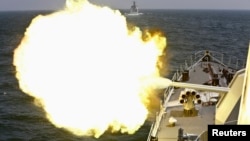China and Russia conducted joint naval exercises this week in the Mediterranean Sea — a sign, some security experts say, that the two countries are stepping up defense cooperation to offset U.S. military primacy.
The Russian Defense Ministry said a total of 10 warships from the Russian Navy and China’s People's Liberation Army Navy took part in the week-long exercises. The Chinese Defense Ministry said the joint exercises focused on navigation safety, at-sea replenishment, escort missions and live fire exercises.
The goal of such exercises “is to strengthen mutual understanding between the navies... regarding boosting stability, countering new challenges and threats at sea," Vice-Admiral Alexander Fedotenkov, a deputy commander of the Russian Navy, said before the exercises began. Fedotenkov is leading the Russia navy in the exercises.
The Russian-Chinese exercises come as NATO and its allies are also holding military drills in Europe.
But Russian Deputy Defense Minister Anatoly Antonov, insisted “the war games aren’t aimed against any third country and aren’t linked to the political situation in the region.”
Former U.S. Deputy Undersecretary of Defense Jeffrey Bialos told VOA that China may be using the exercises to try and keep its strategic options open.
"Maybe the Chinese see this as a way to offset the U.S. situation, and keep their foot in both camps, but this is too soon to tell,” Bialos said.
Former Japanese Minister of Defense Satoshi Morimoto said early in May in Washington that the joint exercises can help both China and Russia position themselves against the U.S. diplomatically.
“If you look at the contents of these exercises, they increase the skills of their troops, they also have cooperation of equipment, they can invite third country to join,” he said.
But Richard Weitz, Director, Center for Political-Military Analysis, Hudson Institute, told VOA that Beijing and Moscow are not becoming military allies despite growing defense ties.
“Their exercises are becoming more robust in East China, off Chinese coast, but it is nothing like the U.S. would do with Japan or our NATO allies,” he said. China and Russia “are not testing joint military operation at any capacity,” he added.
Experts say Russia has increased cooperation with the Chinese in both economic and military spheres while relations between Moscow and the U.S. have deteriorated amidst the standoff over Ukraine.
Russian President Vladimir Putin and his Chinese counterpart Xi Jinping recently signed large economic deals after Putin gave Xi a warm welcome at the Victory Parade earlier in May. Chinese troops marched on Red Square during that event. China has also invited Russian troops to march in a parade in Beijing in September to commemorate the end of World War II.




